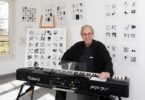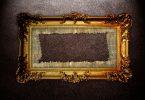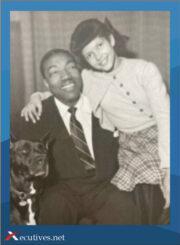
Rita Juon Turner was born in Budapest, daughter of a family of musicians. Her father Joe Turner was one of the most famous Jazz pianists. Born in Baltimore in 1907, Joe Turner already stood out as a pianistic talent as a child, encouraged also by Eubie Blake, who also lived in Baltimore. We are talking about the Roaring Twenties. Joe Turner made an international career as a Harlem Stride pianist and lived for a long time also in Switzerland, where he had a large fan community and where his daughter Rita has grown up. In the late 1930s Joe Turner accompanied the then already very famous singer Adelaide Hall to Europe. After the tour, he went into business for himself, playing in the best venues and concert halls. Joe Turner died in 1990 in Paris, where he spent the last years of his life.
In the interview with Xecutives.net, his daughter Rita Juon Turner talks about her father and she describes how it felt as a child and teenager to be the daughter of a famous musician. Rita Juon Turner attended many boarding schools in Switzerland. With a business degree in her pocket, she traveled to the USA at an early age, where she became the assistant to Quincy Jones, the legendary music producer who eventually became known around the world as the producer of Michael Jackson. Rita Juon Turner later lived for a long time in Brazil and Thailand. Her love for Jazz has followed her all her life. In the interview, Rita Juon Turner discusses many other Jazz musicians whom she had the pleasure of meeting in her life together with her father, including the recently deceased Buddha Scheidegger, Earl Hines and Bill Coleman, to name just a few well-known Jazz musicians.
(Lesen Sie das Interview in Deutsch)
Xecutives.net: Dear Ms. Juon Turner, we have known each other for many years. Your father was Jazz and piano legend Joe Turner, not to be confused with „Big Joe“ Turner, the famous blues singer. He was born in Baltimore (USA) in 1907 and came to Europe in the 1930s. At that time, your father accompanied as a young pianist the already very famous singer Adelaide Hall. How must one imagine this time at that time? What did your father encounter here in Europe?
Rita Juon Turner: My father was very young when he came to Europe in 1938, a talented pianist who stood out with his piano playing even as a teenager. He probably wanted to see the world and was delighted when Adelaide Hall offered him the opportunity to accompany her to Europe, which was a great honor. Adelaide Hall was already very well known in the USA at that time, we are talking about the 1930s. I once heard that another famous pianist was scheduled to accompany the singer across the Atlantic to Europe. It was possibly Art Tatum. As life goes, however, that pianist canceled and my father got his turn.
Xecutives.net: Your father appears in many Jazz encyclopedias and books. There are also movies about him and with him. Do you know how your father grew up, who inspired him, how he came to play the piano? I mean, he told me many years ago in Paris that his aunt was an excellent organ and piano player who was involved in the church. She may have been involved with gospel as well, similar to how that went for Thomas „Fats“ Waller. What do you know about your father’s earliest years? Do you even know anything about his parents?
Rita Juon Turner: He had a wonderful teacher who taught him when he was 5 years old. They called her „Aunt Katie,“ and I had the wonderful opportunity to meet her decades ago on the occasion of my stay in Baltimore. She lamented the fact that she unfortunately could no longer play because of her arthritis, but was delighted to meet me, the daughter of one of her favorite students. My Aunt Jo, my father’s sister, also played piano and sang in the church choir, but that probably didn’t inspire him as much as the incredible, 24 years older and quite famous, Eubie Blake, also from Baltimore. Eubie Blake was still playing great Jazz piano well into old age!
Unfortunately, I know very little about my paternal grandparents. My grandmother is said to have been a rather strict mother and my grandfather an incredibly strong man. Once, when a huge „concert grand“, a big, heavy piano, had to be transported, it took three people on one side and Grandfather Turner was quite sufficient on the other (laughs).
Xecutives.net: Your father did the tour with Adelaide Hall and got to know Europe for the first time. What did he do later?
Rita Juon Turner: When the tour with Adelaide Hall was over, he teamed with a dancer named Lawrie Lawrence in the late thirties. The two continued to tour Europe as a duo, entertaining audiences with their arts. When they arrived in Cortina d’Ampezzo, Italy, where my mother was also playing in a ladies orchestra at the time, the two gentlemen decided to prank the audience by having Lawrie sit at the piano and my father dance. They switched roles.
Xecutives.net: Cortina d’Ampezzo was also later made famous by a James Bond movie, for „For Your Eyes Only.“ But we are talking about the late thirties, just before the beginning of the war. I trust your father danced very well and the audience didn’t notice the role reversal….
Rita Juon Turner: That’s exactly what it was like! But the performance as a whole was rather modest, my parents told me. My mother, by the way, didn’t see through the role reversal either and she immediately found the pretty „dancer“ very likeable. On the second day, however, said gentlemen performed quite correctly and the qualitative difference in the performance was enormous, which delighted the audience all the more, including my mother.
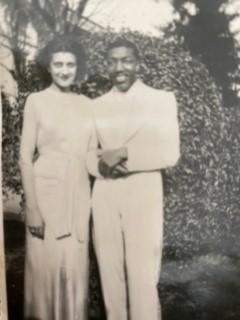
At that time, my mother and father thus became closer – much closer, in fact, so close that they soon decided to get married (laughs). Unfortunately, as a Hungarian, my mother did not automatically get American citizenship when she married at that time, but she lost her Hungarian citizenship, so she became stateless. That was very unfortunate for my parents. The condition for a U.S. passport was a three-year stay in the United States, so that – if one was married to an American – one could become an American for life and live there. At the embassy in Budapest, my father was advised to travel to the U.S. alone and apply for the visa in person on the spot to expedite this procedure. So my father went back to USA and of all times, World War II broke out. He was over in the USA, my mother with me in her arms as an infant was in Budapest.
Xecutives.net: What else do you remember about that time in Budapest?
Rita Juon Turner: I grew up as a normal child after the war, which I spent with my mother in Budapest. I saw my father for the first time in a movie that my mother took me to see. Unfortunately, I don’t remember the name of that film. Dad had a small role as a bar pianist in the film in black and white. I can still remember my mother saying to me: „Pay attention, now you will hear piano sounds coming from your dad, and soon after you will see him on the big screen! It was mind-blowing, and I wondered what all the people in the movie theater around me would say if they knew that was my dad I was seeing for the 1st time in my life.
When Dad finally came to Budapest 1948 to pick us up, he had a huge success, gave concerts, played in revues and also on the radio, but it didn’t please the communist government that such a popular artist didn’t want to be a communist. He was always asked about his political views and they wanted to turn him into a communist. Of course, he refused. They asked him if he was a capitalist? He answered: „I am neither a communist nor a capitalist, but a pianist!“ Unfortunately, the communist leadership did not like this attitude at all and they began to forbid him to play Jazz. That was music of decadent America, my father was told. From then on he was only allowed to play spirituals and music by Russian composers. The latter requirement was a bit difficult, because the only piece he knew and played was „Sabre Dance“ by Aram Khachaturian. However, he played that fantastically. Nevertheless, my parents realized that it was time to leave the country. The plan was to move to the U.S., but with a stopover in Switzerland, where we definitely got stuck.
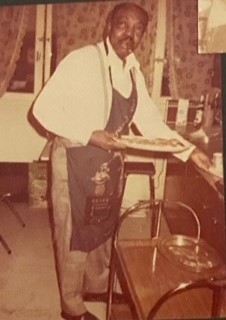
Joe Turner at his hobby, cooking 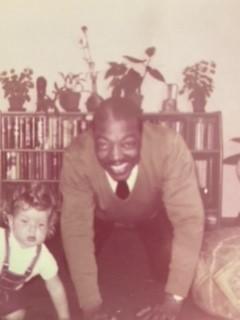
With his granddaughter Sandra, 1965 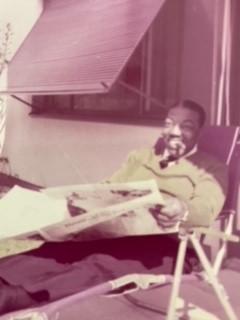
Reading the newspaper in 1965
Xecutives.net: You told me about Quincy Jones many years ago. He is a great music luminary. Can you explain again how you met him? I would take the liberty of providing him with this interview later, and I’m eager to hear his reaction!
Rita Juon Turner: You may do that very gladly and you may greet him from me. Well, I first came to Switzerland to boarding schools so that my parents could travel and work freely. My father lived from music and he had a lot of engagements – both in Switzerland and in other in other European countries. That was not so easy to manage with one child. Soon, however, we settled in Zurich so that I could go to school normally. As a young adult with a business school diploma, I traveled with two friends to New York, where I found work at Mercury Records as Quincy Jones‘ secretary. At that time, he was A&R director and responsible for Jazz recordings, not yet as well-known as today. A great and very interesting task awaited me there in 1962, namely to put his chaotic office in order and also to chat with his famous colleagues in person or also on the phone (laughs). I would certainly have stayed there for a while if my boyfriend in Switzerland at the time hadn’t been homesick for me. He missed me a lot and said I should return to Switzerland so we could get married (laughs). Reason enough to leave Quincy. He was „not so amused“ about my decision. I didn’t meet Quincy again until many years later at the Montreux Jazz Festival on the occasion of his 50th stage anniversary, to which he invited my husband and me. We had a seat of honor in the 1st row and enjoyed every minute.
Xecutives.net: Your father was drafted for military service in the U.S., much like his fellow musician, pianist Willie „The Lion“ Smith. The nickname „The Lion“ was apparently attributed to him for his great bravery during the war. Jazz was enormously popular during the war, and later to help people of different cultures and ethnicities understand each other better. Nevertheless, your father grew up in difficult circumstances, considering that in the 1920s and 1930s well-known black musicians were a thorn in the side of many whites, and not only because of the music. A good example is Ella Fitzgerald. How did your father deal with that as a black musician?
Rita Juon Turner: My father was also drafted, but fortunately and in contrast to the „Lion,“ he did not have to go to the front. He was allowed to keep the soldiers happy with his piano playing. As for racial discrimination, luckily he found his way out to Europe. He liked it here in Europe extraordinarily well. Not only because he had founded a family here, but also because his music was particularly appreciated here. A very special help in this respect was Johnny Simmen in Switzerland, who died many years ago – and one may say „legendary“. Our family owes him a great deal. He was a great Jazz expert and supported my father wherever he could. He was certainly one of the important reasons why we finally settled in Switzerland. He was certainly also a reason for my father not to go back to the USA. From a musical point of view, a return to the USA would certainly have been very beneficial for my father and his career. However, it was clear to him and my mother that life at that time would have been very difficult for a mixed couple in the USA. Since my father was also not very ambitious and preferred to live a good – and above all peaceful – life, he preferred to stay in Europe and he never regretted this decision until his death.
Xeucutives.net: How did you yourself grow up in this musical environment and how did the Jazz your father pursued shape you personally?
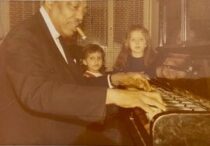
Rita Juon Turner: As far as I was concerned, I was like most children of famous fathers or mothers. I took it all for granted and couldn’t imagine that it could have been any other way. It took me years to understand what an outstanding Jazz pianist he really was.
I took lessons very early as a child in Budapest with the best piano teacher in town, and after a year I could play quite well. But then we emigrated to Switzerland. Here in Switzerland I was in boarding schools, where unfortunately the piano teachers were not as demanding as my strict teacher in Hungary. So my motivation slowly faded away as I realized that I was hardly making any progress since Budapest. The joy of playing faded and, as it happens when you are a child, I preferred to devote myself to other pleasures. But the interest in Jazz music, especially good piano Jazz, was always there with me.
Xecutives.net: Your father had personal contact with Louis Armstrong, Art Tatum and Willie „The Lion“ Smith, but also with Thomas „Fats“ Waller, arguably the best-known Harlem Stride pianist. Did he tell you about that? How was he connected to these stars of the 20’s and 30’s? Your father told me about an encounter also with Art Tatum, whom he seemed to have held in special esteem.
Rita Juon Turner: My father also told me a lot about Art Tatum, but even more about Thomas „Fats“ Waller, with whom he had obviously experienced many funny things. He could always laugh heartily at the shenanigans they got up to in New York, and they both respected each other as musicians. Waller died at a very early age due to his lifestyle. He tended to lead an unhealthy lifestyle, and was certainly the most popular of all these talented pianists.
When Louis Armstrong gave a guest performance in Zurich at the Kongresshaus in 1955, my parents were there, of course. They were sitting quite in front – I think even in the front row – and when Louis suddenly saw my father, he obviously stopped playing, left the podium and greeted him full of joy. Unfortunately, I was not there. So I know this anecdote only from hearsay.
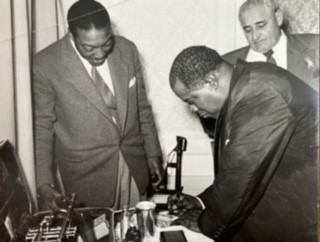
But we always had famous visitors at our home, whom I often met. I remember Lionel Hampton very well, also Teddy Wilson and Albert Nicholas. My father was very connected with these musicians, both amicably and musically. The latter recorded a record with my father and they always practiced in my room because the piano was there – much to my annoyance, because then as a teenager I often couldn’t be in my room for hours. He also had a close friendship with Earl Hines. Not a birthday went by without a card from him snowing into the house. Later, when my father lived in Paris, he was especially close with Bill Coleman, also a very good friend. Coleman lived in the same building as my father. Well, after all the names, of course I still have to mention Erroll Garner. He was one of his closest friends. The latter even became the „godfather“ of my half-sister.
Xecutives.net: Your father lived his last years in Paris and played there at La Calavados bar, close to the Avenue des Champs-Élysées. He always invited me for a beer when I visited him as a student. A beer there at that time cost, horrendously for a student, 60 francs! Why did he choose Paris?
Rita Juon Turner: He liked the performances there very much. All of Paris knew his piano playing. People who were interested in his music came to visit him again and again. For my dad, Paris was much more interesting from a musical point of view than Zurich, and he therefore felt extraordinarily comfortable there. Recordings with him and his friends were also made there, which I still enjoy listening to today.
Xeucutives.net: I keep thinking about the insane concert in 1961 at the Schiers High School, when Joe Turner hit the keys in front of a few school classes and he literally blew everyone away, including Thomas Philippi and Buddha Scheidegger. The latter, he later told me, was asked by your father to play as well („An Evening With Joe Turner / Schiers Bounce,“ Downtown Records). The students probably didn’t know what was in store for them. I think that this live recording, which was fortunately made, is one of the very best in piano Jazz. Were you also there? What did your father tell you about this legendary concert?
Rita Juon Turner: Whenever I was in the fortunate position to attend one of my father’s concerts, which unfortunately didn’t happen too often, I was of course always very proud of him and happy that I was his daughter. The joy of all those many people listening to his music was wonderful for me. As you told me, his motto when it came to stride piano was „It’s music that makes you happy!“. It was always happy sounds that he was able to conjure up on the piano, whether there were good or bad instruments, and that made everyone around him happy. Even with spirituals, he managed to do that.
But now, to come back to your question regarding the legendary concert in Schiers: Unfortunately, and I still regret this very much, I did not experience this concert live, because I had to go to school in another place. But it was also not foreseeable what was going to happen there. The recordings, which are preserved on a CD and of which you speak, speak volumes! My father himself did not tell me personally too much about this concert. What I know about it, I learned later from Thomas Philippi and partly from Buddha Scheidegger, whom you also knew well.
Every time there is talk of this concert in Schiers, an episode comes to my mind that I experienced in the housekeeping school in Valbella. The visit was obligatory for us girls, and in order to make it a bit more fun for us, and also because it needed a suitable house, we were sent to a chalet in Lenzerheide/Valbella. There, however, a very strict middle-aged lady ruled, who 1. didn’t like us and 2. didn’t like it at all when we young girls played on the piano. That was funny and therefore, from the lady’s point of view, highly reprehensible, of course. However, „classical“ pieces were tolerated, even if only grudgingly, because that was considered sublime music. When I was inspired to play something Jazzy at some point, it was, of course, out of the question. Jazz was strictly forbidden. We had to abide by that if we didn’t want to get into trouble. When the three weeks were up, many of us were picked up by our parents. My father also came. When Dad was there, we all begged him to play us something really „groovy“ and „swingy,“ which he did, of course, with great pleasure – and not just one piece! I will probably never forget the face of our grouchy lady, who was „unfortunately“ condemned to silence at that moment (laughs).
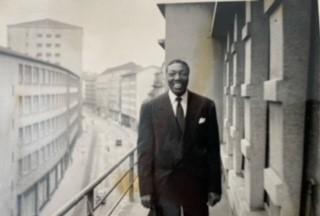
Xecutives.net: At this concert in Schiers, he adapted the song „Nach em Räge schiint D’Sunne“ by Artur Beul, with whom I was able to talk in depth about music shortly before his death, arguably one of the greatest musicians Switzerland has produced. Beul’s records sold over 50 million copies! Joe Turner recorded the Beul song in Stride style and put a witty lyric over it in Swiss German, then the audience, consisting of students and teaching staff, was unstoppable, including your father. What comes after that is of the finest and best!
Rita Juon Turner: Yes, „Nach em Räge schiint D’Sunne“ was a huge hit in Switzerland. With it, my father definitely played his way into the hearts of the listeners in Switzerland. He played the song over and over again in his own way. The song was also a hit in the USA, as Artur Beul told you very nicely. The Andrews Sisters recorded the song and called it „When A Swiss Boy Is Calling On A Swiss Girl In June.“ The song made it to the hit parade in the USA! By the way, I found your interview with Artur Beul very interesting, also the one with Buddha Scheidegger, which you captured very nicely. I didn’t know that Beul himself had never been to the USA.
Xecutives.net: Joe Turner was a welcome guest in Basel at Atlantis. This is the bar whose management had turned down the Beatles a long time ago, when they were not so well known. There are many stories and anecdotes about this mishap. In any case, your father had a special connection with Basel and with many music lovers in Switzerland in general, including Buddha Scheidegger, Fritz Trippel and Henri Chaix. How do you remember these people, all of whom have unfortunately passed away and all of whom had a great musical influence on me?
Rita Juon Turner: As far as Basel is concerned, I can tell you very little. I was still quite young at that time. Of course, I have fond memories of the Atlantis because of the snakes and the crocodiles that I was also allowed to marvel at there as a child. Many people interested in music and in my father talk about the Atlantis, which was of course a big deal at that time.
As for Dad’s Swiss friends, I have to mention Buddha Scheidegger again. He knew him very well and later, even after my father’s death, we had a loose contact with him and his wife. He, who was also a public prosecutor and chief justice, played for me and my late husband on the occasion of our 120th birthday (2 x 60), which my husband and I celebrated with many friends at that time. Fritz Trippel is only remembered by me as a student who visited us now and then for piano lessons, and Henri Chaix was known to me as an accomplished musician and pianist, but I did not know him that well. I was once at one of his concerts where I greeted him afterwards and we also talked about my father.
Xecutives.net: You look back on a past time connected with a lot of Jazz and stays in Brazil and Thailand, where you lived for a long time. How do you explain the fact that Jazz is unfortunately only known by a few people today? What is the connection between Jazz and our lives and how has Jazz influenced your own life?
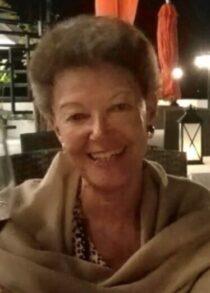
Rita Juon Turner: It’s music that demands something from people that other music doesn’t always do and is therefore easier to consume. A lot of Jazz is improvisation, a lot of it is unpredictable. That can confuse and overwhelm people. All the musicians we talked about were specialists in improvisation.
It is indeed a pity that Jazz is not as popular today as it was back then, but I have the impression that more and more people are getting a taste for it again and are attracted by quality, including musical quality. You can find it in classical music, but also in Jazz, for example. For me, Jazz was and is something that belongs to my life and without which my life would certainly be pretty dull. I think Jazz had to take a back seat – hopefully only temporarily – because electronics suddenly came along and demanded much less skill than real instruments. Electronics is not my cup of tea, although you can undoubtedly create interesting things with it sometimes. But the heart often falls by the wayside.
I consider myself privileged to have grown up in a family of musicians, which was not always easy, but helped me to remain a cheerful and positive person. A gift for which I am enormously grateful!
Xecutives.net: Dear Ms. Juon Turner, thank you very much for the many good conversations and, in keeping with your father’s motto, I wish you a hearty „Keep swinging!“.
© 2021 by Christian Dueblin. All rights reserved. Other publications are only allowed with the explicit permission of the author.
More interesting interviews with renowned Jazz musicians (in German or English):
- Richard Clayderman about “Ballade pour Adeline”, his approach to music and his personal feelings about interpretations
- Hazy Osterwald about the beginnings of his career, his love of jazz and the changes in music during and after World War II
- Vladimir Ashkenazy about his life, his own musical gift and his spiritual comprehension of music’s significance beyond words
- Nicki Parrott about her love for Jazz, her career, music legend Les Paul and the significance of musical mentors for young talents
- Artur Beul über sein Leben, seine Musik und seine Welthits
- Buddha Scheidegger über sein „Doppelleben“ als Musiker und Jurist, über Jazz und die Schweizer Jazz-Szene
- Dick Hyman about playing the piano, jazz and life
- Chris Hopkins über Jazz und Echoes of Swing, seine musikalische Karriere und über Hazy Osterwald, Ralph Sutton und Dick Hyman
- Dave Ruosch über seinen musikalischen Werdegang und die Blues- und Jazzszene in der Schweiz


